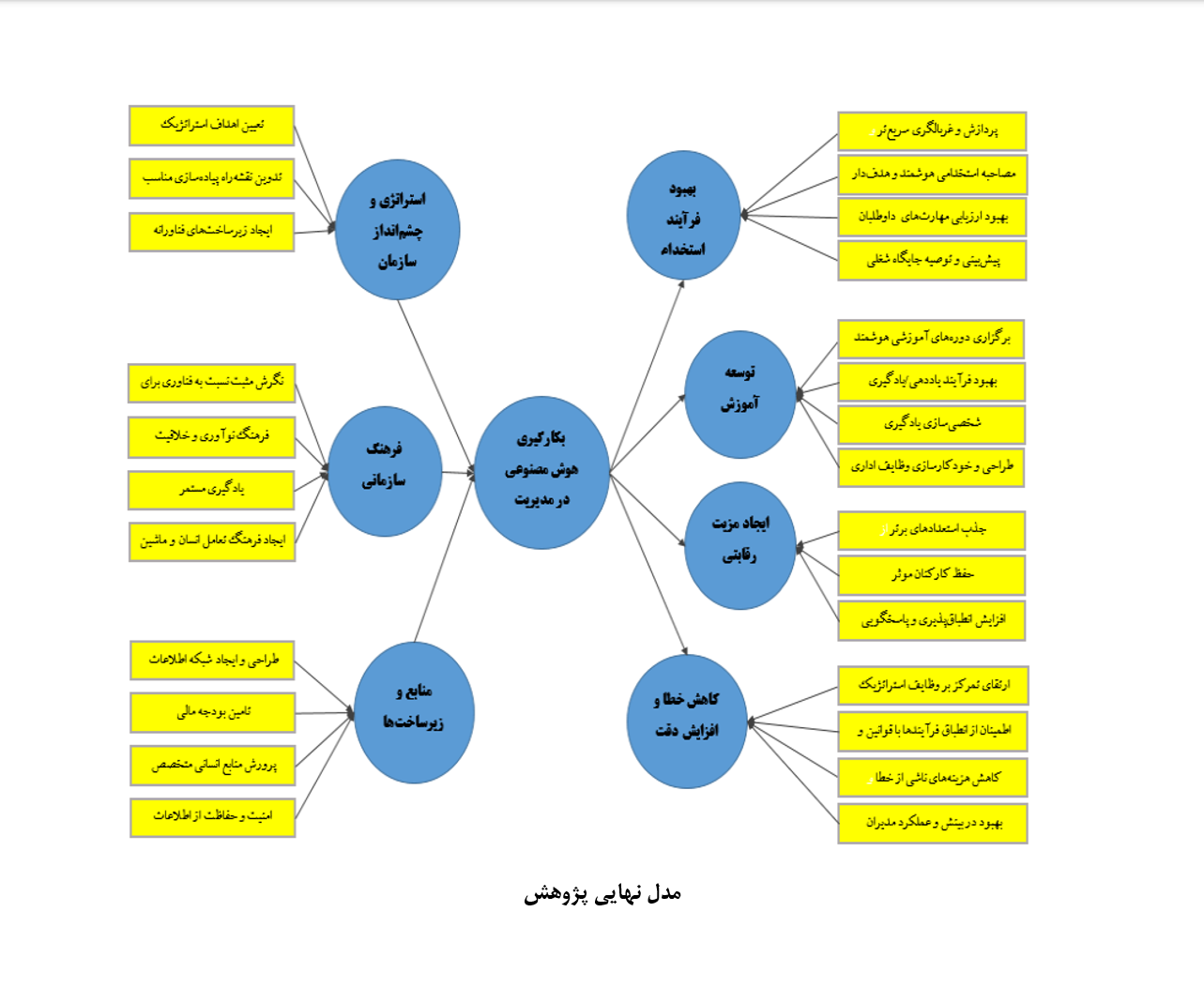Presenting a Model for the Application of Artificial Intelligence in Private Organizations with the Influence of Human Resource Management: Antecedents and Consequences
Keywords:
Artificial Intelligence, Antecedents and Consequences, Human Resource Management, Private OrganizationsAbstract
The present study aimed to propose a model for the application of artificial intelligence (AI) in private organizations influenced by human resource management, considering its antecedents and consequences. The research method was applied in terms of purpose and exploratory mixed-method (qualitative-quantitative) in terms of data collection. The statistical population of the study consisted of three sections: scientific documents, the qualitative section (experts), and the quantitative section (human resource managers of private organizations and companies in Tehran). The sample size in the qualitative section included 19 experts, who were selected using the principle of saturation and purposive non-random sampling. Additionally, in the quantitative section, 252 managers were selected through convenience sampling. In the qualitative phase, semi-structured interviews were used to collect data, and in the quantitative phase, a researcher-made questionnaire derived from the qualitative section was employed. In the qualitative section, validity was calculated through expert opinions, and reliability was assessed using inter-rater agreement and agreement between two coders, with the results indicating the validity and reliability of the qualitative data. Moreover, in order to determine the validity of the questionnaire, content and construct validity were utilized, and to assess reliability, Cronbach's alpha coefficient and composite reliability were employed, with the results indicating the validity and reliability of the tool. Data analysis in the qualitative section was conducted using thematic analysis with Maxqda 2022 software, and in the quantitative section, based on the research questions, descriptive and inferential statistical methods (one-sample t-test and confirmatory factor analysis) were applied using SPSS v23 and Smart PLS v8 software. The research findings indicated that the antecedents of AI application in human resource management include organizational strategy and vision, organizational culture, and resources and infrastructure. The consequences of AI application include improvement in the recruitment process, development of training, reduction of errors, increased accuracy, and the creation of competitive advantage. Furthermore, based on the identified antecedents and consequences, the research model was designed and demonstrated appropriate validity.
Downloads
References
Roshandel Arbatan T. Artificial Intelligence and Changes in the Media Industry. Media Management Review.
;2(1):1-2.
Talerico C, editor HR Analytic Competencies: A Comparison of Developed Versus Developing Country HR
Practitioner Skill Sets2021.
Akbari A, Tahmasebi. Identifying the Applications and Requirements of Artificial Intelligence in the Recruitment and
Hiring Process. Scientific Journal. 2023;21(1):75-88.
Heshmdar A, Kordi M. Examining the Effectiveness of Artificial Intelligence Systems in Human Resource Functions.
Contemporary Research in Management and Accounting Sciences. 2022;12(4):1-6.
Vrontis D, Christofi M, Pereira V, Tarba S, Makrides A, Trichina E. Artificial intelligence, robotics, advanced
technologies and human resource management: a systematic review. The International Journal of Human Resource
Management. 2021:1-30. doi: 10.1080/09585192.2020.1871398.
Mirsalimi ES, Afkaneh M. Human Resource Management Policies in Addressing Opportunities and Threats in the
Use of Social Networks in Organizations. Human Resource Management Research. 2023;4(14).
Yabanci O. From human resource management to intelligent human resource management: a conceptual perspective.
Human-Intelligent Systems Integration. 2019;1(2):101-9. doi: 10.1007/s42454-020-00007-x.
Huselid MA. The science and practice of workforce analytics: Introduction to the HRM special issue. Human Resource
Management. 2018;57(3):679-84. doi: 10.1002/hrm.21916.
Manouchehri M, Mohammadizadeh Zeytouni B, Darvish Zadeh Belgor F. The Practical Role of Artificial Intelligence
in Human Resource Management in Banks. Digital Library. 2022.
Rajabi Farjad H, Hajiyeh A. The Impact of Electronic Human Resource Management on Talent Management at the
Iranian Space Research Institute. Scientific-Research Quarterly of Standard and Quality Management. 2022;12(2):102-31.
Emadi A, Seyed E, Hamidi. Determining the Strategic Position of the Human Resource Management System in the
Ministry of Sports and Youth. Sports Management and Motor Behavior Journal. 2022;18(35):221-36.

Downloads
Published
Submitted
Revised
Accepted
Issue
Section
License
Copyright (c) 2024 Journal of Study and Innovation in Education and Development

This work is licensed under a Creative Commons Attribution-NonCommercial 4.0 International License.










